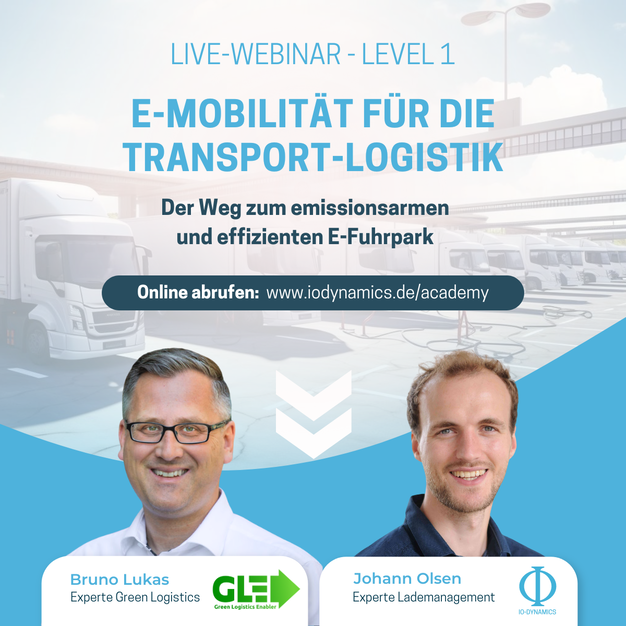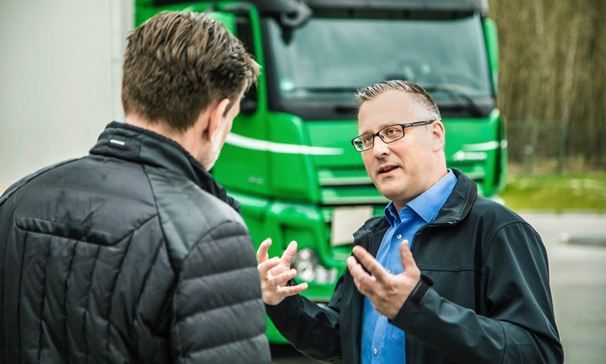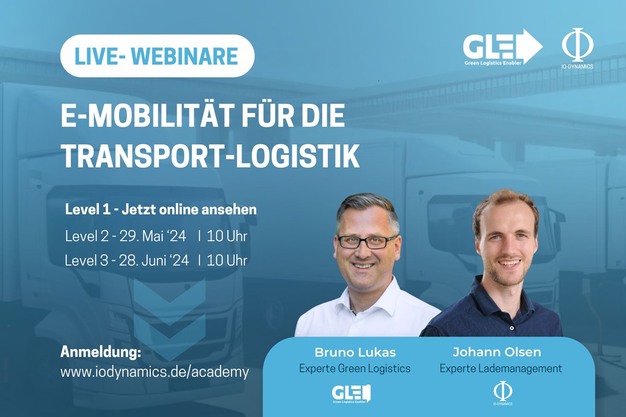For a long time, electric vehicles were considered a solution for short distances, but significant technological advancements have been made in the past decade. In late April, IO-Dynamics and Green Logistics Enabler invited industry participants to the kickoff of their three-part webinar series titled "E-Mobility for Transport Logistics". Speakers included Johann Olsen, co-founder and CEO of IO-Dynamics Ltd, and Bruno Lukas, founder and owner of Green Logistics Enabler, as well as a DEKRA-certified "Consultant for E-mobility and Alternative Drives". In this first webinar, the two e-mobility experts initially discussed the "Path to a Low-Emission and Efficient Electric Fleet".

"In the transport and logistics segments, things are getting serious now. Many technological leaps we've seen in the passenger car sector are now transitioning into transport logistics," Johann Olsen began the presentation. "The topic of transport logistics, especially trucks, poses a significant challenge in terms of energy amounts. We're dealing with higher charging capacities, sometimes longer distances, meaning, currently, one looks at: What are the lengths of routes in one's fleet? Where can I start with e-mobility? When does an electric truck pay off? Currently, there are still high acquisition costs, but we expect quite rapid progress in the next few years concerning the Total Cost of Ownership (TCO). This is due to technological advancements recently. It's the right moment to get started."
Logistics mobility transition
But what about the mobility transition in logistics? According to Bruno Lukas, relevant drivers for green logistics include shippers applying pressure, a changing offering from the vehicle industry, partly due to EU legislation and local politics at the location. Moreover, a change in thinking among end consumers, which is now affecting, for example, grocery shopping at the supermarket, as well as political objectives and legislation.
According to a study by the International Council on Clean Transportation, "Battery-powered trucks are expected to be the most cost-effective pioneers for decarbonization for most truck classes by 2030," Lukas emphasized with a view to the full cost accounting. "In regional and urban goods traffic, BEVs (battery-electric vehicle) are also expected to be the most economical." E-mobility is not just a bridging technology, Olsen underscored. This is shown by a clear increase in registration numbers. Technological advancements, infrastructure, sustainability, and economic aspects play a role here.
First steps of the transformation
So, what can a fleet operator do if they want to enter into e-mobility? The first step is to examine the logistics process, according to Lukas. Central aspects include mobility and location analyses, available resources, and the available budget. The vehicle selection must match the logistics process. The maximum payload, required cargo space volume, total weight, range, and charging options, as well as the space on the chassis, play a role. Crucial are a mobility and location analysis and setting measurable CO2 reduction targets, on the basis of which a roadmap for implementation can be developed.
"Acquisition and operating costs are two of the central positions in the full cost accounting (TCO). In terms of acquisition costs, an electric commercial vehicle is currently between factor 2.0 and 2.5 x more expensive than its diesel counterpart." On the operating cost side, however, there is potential for savings, for example, through CO2 toll exemptions or better energy efficiency of the electric drive.

'Charging infrastructure requires intelligent energy management'
A central issue for the electric fleet is the development of the charging infrastructure. "Depending on individual requirements, I have to consider: What are my routes? Where can I charge in between?", said Olsen. There are four different charging speeds: from slow charging (enables 20km/h) to fast charging and ultra-fast charging up to megawatt charging (~833 km). "The charging infrastructure requires intelligent energy management" and also the site conditions – rechargeable energy per day, parking time, load profile through cooling or sorting systems etc. – must be examined.
Despite the high acquisition costs, there are various financial advantages, according to Lukas, that can help reduce costs such as leasing, long-term rental, pay-per-use, depot charging, fueling with self-produced electricity, contracts with electricity suppliers, sharing models, and smart energy management – a core competence of IO-Dynamics. In general, "The longer the vehicle is in operation, the more favorable the conditions." In addition, there are direct and indirect, e.g., local funding opportunities, greenhouse gas quotas, and CO2 toll savings.
More planning certainty
For the start, the two experts recommended planning ahead, securing funding in time, charging with self-generated electricity, and not waiting too long, "because we expect dynamics in this area in the coming years," emphasized Olsen. It is also important to get good advice, e.g., from Green Logistics Enabler or IO-Dynamics.
Lukas finally appealed to politicians: "The most important thing is that politics must provide the economy, and especially logistics, with planning certainty, and that is currently not the case. Last December, many set out and were then caught cold when it was announced that the KSNI funding program would not be continued. If such funding programs are launched in the future, they should indeed be guaranteed for a duration. Logistics companies do not plan until the next election but over six, eight, or ten years. We need planning certainty for relief on the one hand, and on the other hand, for the relief of low-carbon drives."

Here you can register for the following webinars on the topic of e-mobility.
For more information: IO-Dynamics GmbH
IO-Dynamics GmbH
Johann Olsen
Lise-Meitner-Str. 2
24941 Flensburg
Tel.: +49 461 402 142 0
Email: [email protected]
www.iodynamics.de
 Green Logistics Enabler Consulting
Green Logistics Enabler Consulting
Bruno Lukas
Ziekowstr. 137
13509 Berlin
Website: +49 30 43572 503
Email: [email protected]
gle-berlin.de
